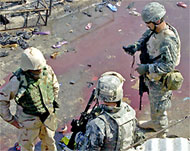Deaths soar in Iraq shrine clashes
More than 130 people are reported to have been killed in sectarian violence that has swept Iraq in the wake of a bomb attack on a major Shia shrine.

In the worst single incident, officials said 47 people, who had taken part in a joint Sunni and Shia demonstration in Baghdad against Wednesday’s bombing, were hauled from their cars and shot dead.
Police said the attackers, who have not been identified, had set up a fake checkpoint on the outskirts of the capital.
The wave of violence was sparked by Wednesday’s bloodless bombing of the Golden Mosque in Samarra, one of Shia Islam’s holiest sites, blamed by some officials on members of al-Qaida.
All police and army leave has been cancelled as the death toll continued to rise.
Police and military sources said the deaths, mostly of Sunnis, were concentrated in the country’s two biggest cities, Baghdad and Basra, while dozens of Sunni mosques have been attacked and several set ablaze.
Among other incidents, 16 people including eight civialians were killed in a bomb aimed at an Iraqi army foot patrol in the religiously divided city of Baquba.
On Thursday morning, three journalists working for Al-Arabiya television were found shot dead after being attacked while filming the aftermath of the bombing in Samarra.
They included correspondent Atwar Bahjat, a former reporter for Aljazeera.
Political crisis
 |
|
US soldiers inspect the blast site |
With tensions escalating, a crisis summit called by President Jalal Talabani was thrown into turmoil when the biggest Sunni political group, the Iraqi Accordance Front, boycotted the meeting in protest at what it called the government’s failure to protect Sunni mosques.
“The government neglected to provide security for our sites,” Iyad al-Samarrai, a front official said, announcing the boycott. “They did not condemn these acts of aggression.”
Another Front official said it would suspend participation in US-sponsored talks to form a national unity coalition.
Accusing Shia leaders of fostering the violence, Tareq al-Hashemi said the Front would need an apology from the Shia-led government before it would consider rejoining talks on a national unity coalition.
Talabani had called Thursday’s meeting at his residence to ease tensions which he had earlier warned could lead to a “devastating civil war”.
|
“We are facing a major conspiracy that is targeting Iraq’s unity” |
“We are facing a major conspiracy that is targeting Iraq’s unity,” Talabani said on Wednesday.
The meeting went ahead without the presence of Front members.
Meanwhile, the Association of Muslim Scholars, the leading Sunni religious body, accused Shia leaders of fuelling the violence.
The comments were a rare, if veiled, attack on Grand Ayat Allah Ali al-Sistani, a revered figure for the Shia, who has called for protests but also restraint.
Call for restraint
Washington, which wants stability in Iraq to help it extract
around 130,000 US troops, has also called for restraint,
reflecting international fears that Iraq may be slipping closer to an all-out sectarian war.
 |
|
All police and army leave has |
Condoleezza Rice, the US Secretary of State, who is visiting the Middle East, echoed calls from President George Bush and the United Nations for Iraqis to pull together and not be pushed into sectarian strife by a bloodless but highly symbolic attack.
Some have blamed the attack on Abu Musab al-Zarqawi, al-Qaida’s leader in Iraq.
“The only people that want a civil war in Iraq are the terrorists like Zarqawi,” Rice said, addding that the Iraqi people “are working under extremely difficult circumstances to bridge sectarian differences.”
The United Nations Security Council sounded a note of alarm in calling on Iraqis to rally behind a non-sectarian government.
“The members of the Security Council understand the anguish caused by the attacks, but urge the people of Iraq to defy its perpetrators by showing restraint and unity,” it said.